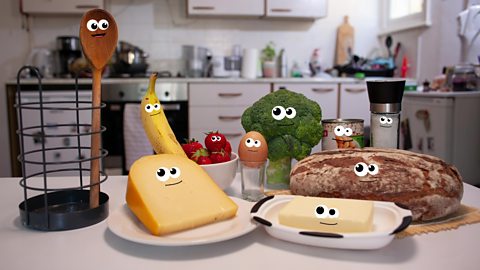What is food processing?
Food processing is when one type of food is used to make other foods.
In this article you can learn:
- the importance of food processing
- types of food processing
- how tomatoes, grains and potatoes are processed
This resource is suitable for Health and Wellbeing for primary school learners.
Video - Food processing
In this video, the Great Spoon explains the importance of food processing and different methods of food processing.
Find out how food processing turns simple ingredients into a wide variety of foods and drinks.
TOMATO Alright catch you guys later. No worries. I’ll just… wait here. Nae bother. I'm not scared. I am a strong independent tomato.
MYSTERIOUS VOICE Hellooo!
TOMATO Argh!!! Stay back! I know… karate?
PASTA SAUCE We’ve been wanting to introduce ourselves, Tomato!
CHORUS °Ő´Çłľ˛ąłŮ´Ç…
TOMATO You… know me?
PASTA SAUCE You're one of us.
CHORUS One of us…
TOMATO That's…very creepy.
CHORUS Very creepy…
PASTA SAUCE We are your friends! We all have tomato as an INGREDIENT!
CHORUS Ingredi-
PASTA SAUCE OK that’s getting annoying now guys. We are all made of tomato! Tomato ketchup, chopped tomato, even sundried tomatoes!
SUNDRIED TOMATOES Actually, it's a tan.
PASTA SAUCE And me - pasta sauce.
TOMATO But you’re not round and cute like me! What's going on?
PASTA SAUCE The Great Spoon will explain!
CHORUS The Great Spoon!
THE GREAT SPOON Things can look and taste different but share the same ingredients.
TOMATO Wait. You get your facts from a spoon?
THE GREAT SPOON A tomato is a raw fruit. Raw foods, like tomatoes, can be processed into different food products - chopped and tinned, blended into a sauce, even dried. Some products have lots of ingredients - foods that are mixed together to make something new.
PASTA Like us! I’m pasta, this is bread We’re mostly made of wheat. It says on my ingredients label. That’s why we’re best friends! We’ve got so much in common!
BREAD Not really…
PASTA But we're both made of wheat
THE GREAT SPOON …and other different ingredients. And you have been processed differently. So you look different. You even taste different.
PASTA I don’t believe that… Oh… You're right. We do taste different.
BREAD So you can put your tongue away now.
PASTA Sorry.
TOMATO Well that was embarrassing…
CHORUS ·ˇłľ˛ú˛ą°ů°ů˛ą˛ő˛őľ±˛Ô˛µâ€¦
How are tomatoes processed?
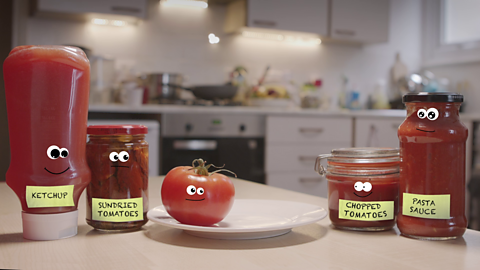
Pasta sauce, ketchup and sundried tomatoes all look very different, but they have something in common…tomatoes!
Tomatoes follow different journeys to end up as each of these foods.
For example, they are cooked and mixed with lots of other ingredients, like garlic, to make a tasty pasta sauce.

How are grains processed?
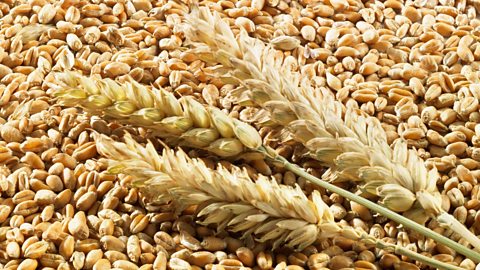
In the UK, we eat a lot of grains like rye, maize, oats, barley and wheat.
- Some grains are used to make breakfast cereals
- Some grains are ground into flour. This flour can be used to make bread, pasta and cakes. Cakes also contain lots of sugar so you should enjoy them in moderation.
- Other grains are used to feed animals

How are potatoes processed?
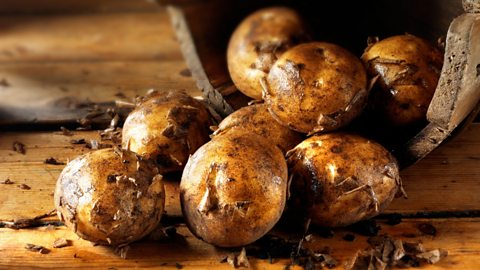
Potatoes can be processed to make roast potatoes, mashed potatoes, chips and even crisps.

Test your knowledge
Try this short quiz about food processing.
Challenge
We process foods to give us lots of variation in what we are eating and to make raw foods stay fresher for longer.
Can you think of any foods that last longer because they have been processed? What ingredients are in them?
Here are some ideas to get you started:
- tinned foods
- dried foods
- frozen vegetables
More on Food and health
Find out more by working through a topic
- count8 of 10
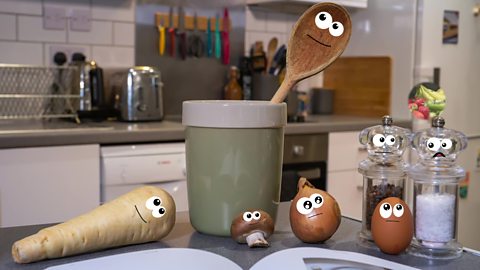
- count9 of 10
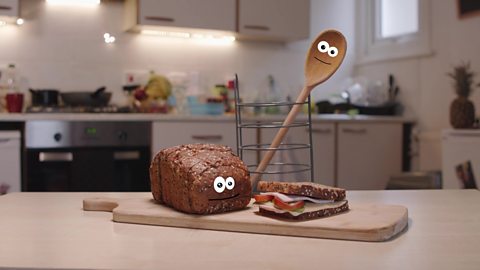
- count10 of 10
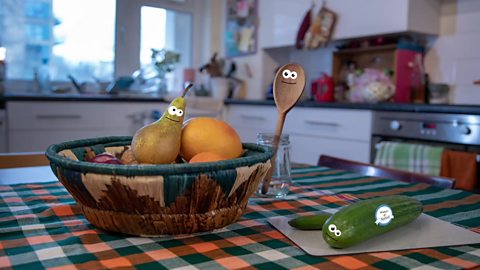
- count1 of 10
